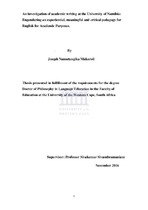An investigation of academic writing at the University of Namibia : engendering an experiential, meaningful and critical pedagogy for English for academic purposes
Abstract
The study aims to investigate academic writing at the University of Namibia and intends to explore whether a critical, meaningful and experiential pedagogy in EAP that enhances voice and agency in English for Academic Purposes (EAP) can be engendered in the Namibian EAP classroom. Moreover, it aims to investigate the experiences and perceptions of first year EAP students regarding the current EAP pedagogy at the University of Namibia. The study aspires to generate an understanding of the components students find difficult when they engage in academic essay writing. It provides a holistic and profound understanding of what critical, meaningful and experiential pedagogy is and wish to propose the process-genre writing approach as tool to a critical, meaningful and experiential pedagogy to teaching academic writing. The study draws it theoretical underpinning from critical pedagogy as postulated by Freire (1973) and Canagarajah (1999). This research supports the premise that the English language classroom is a cultural space where various agendas are negotiated and contested and explores the complexity of language pedagogy in the English classroom (Canagarajah, 1999). Moreover, this study is based on the premise that pedagogies are not received in their own terms but are rather appropriated on different levels in terms of the needs, interests and values of the local communities (Canagarajah, 1999, p.121-2). As research design, the study adopts an exploratory design using both qualitative and quantitative data. Besides, the study uses SPSS analysis and written error analysis methodologies. While the former provides an understanding of EAP students' perceptions and experiences regarding the current EAP pedagogy at the University of Namibia, the latter examines the components that EAP students find difficult when they engage in academic essay writing. As instruments, the study uses a semi-structured questionnaire and academic essay administered to 200 EAP first year student- participants. The findings indicate that the current EAP pedagogy at the University of Namibia does not promote experiential, meaningful and critical learning nor does it enhance voice and agency in the EAP classroom, thus a critical, meaningful and experiential EAP pedagogy that enhances voice and agency can be engendered in the Namibian EAP classroom. The findings also indicate that EAP students find the use of APA referencing skills and the use of discourse markers the most difficult when they engage in academic essay writing. Furthermore, the literature that I reviewed for this study critically exposed how practices in EAP and institutional policies stifle voice and agency in the EAP classroom. The entire process of this study has generated some insights that can advance our understanding of a critical, meaningful and experiential pedagogy in EAP and academic writing. These insights are: (1) A need to enhance EAP educator’s critical awareness, (2) We must minimize students' text-appropriation, (3)A need to re-conceptualize and decriminalize the concept of plagiarism in EAP, (4) A new approach to teaching APA referencing in EAP academic writing, (5) A need to renegotiate voice and agency in academic writing, (6) Writing is a process not an event, (7) We need to move towards an appropriate critical, meaningful and experiential pedagogy in EAP.
The study proposes the process-genre academic writing approach as pedagogy towards a critical, meaningful and experiential EAP pedagogy in teaching academic writing. All in all, the study upholds the premise that a critical, meaningful and experiential EAP pedagogy that enhances voice and agency can be engendered in the Namibian EAP classroom.

